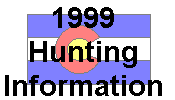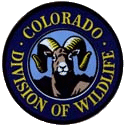
















|
 Access to Colorado Access to Colorado
Public Lands
Reprinted from a brochure from the state of Colorado Board of Land Commissioners
More than one-third of Colorado's land area is owned by the public and available for public use. These public lands are managed by several federal and state agencies and local governments. Knowing about access and trespass can avoid problems among users and owners of lands - public and private - in Colorado. This brochure is intended to promote public awareness concerning access to public lands with minimum interference to adjacent private landowners.
Federal Public Lands
The primary federal land management agencies in Colorado are the Bureau of Land Management (BLM), the US Forest Service (USFS) and the National Parks Service (NPS). National Parks and Monuments usually charge a fee for entry. While camping and many forms of recreation are encouraged, hunting and some other outdoor activities are restricted. Contact local NPS offices for specific information.
The BLM manages 8.3 million acres and the USFS manages 14.3 million acres in Colorado. These lands are available for a variety of recreational uses; such as hunting, fishing, wildlife viewing, hiking and camping; along with other authorized uses such as livestock grazing, timber harvest and mineral development.
How do I gain access to federal public lands?
Legal access to federal land is provided by a system of public and agency roads and trails. Public roads are intended to meet the transportation needs of the public user. Generally, a public road is any federal or state highway or county road administered by the state or county. BLM and USFS roads and trails are maintained for the administration and use of federal lands. Although open to the public, agency officials may restrict or control the use of these roads. Restrictions may be imposed for protection of sensitive or critical resources or to meet specific management needs. Land management agencies do not always have legal rights-of-way on all access roads or trails entering federal lands.
Authorized private use of federal land, such as livestock grazing, does allow the lessee to post or sign the land as being private. The lessee of federal lands cannot deny legal access or charge an access fee for others to use such lands.
What if I'm denied access to federal public lands?
If you think you are illegally denied access to federal lands, you are asked to contact either the administering agency listed in the map legend or use the Colorado tollfree hotline (1-800-332-4155).
State School Board Lands
State School Board lands are lands that were granted by the Federal Government to Colorado as statehood, mainly to provide income to support public schools. These land are managed by the State Board of Land Commissioners through an agency known as the State Land Board. Lands are leased for surface uses and mineral extraction, and the lessee has the right to deny access.
How do I gain access to State School Board land?
Access to or across State School Board lands requires permission from the surface lessee.
Private Lands
Two-thirds of the land area of the State of Colorado is privately owned. It is unlawful to enter private lands in Colorado without permission of the landowner. Colorado law does not require private lands to be marked, fenced or posted in any manner. Depending on the circumstances, trespass in Colorado may be prosecuted as a misdemeanor or as a felony. Additionally, the Colorado Revised Statutes state that "it is unlawful for any person to enter upon privately owned land or lands under the control of the State Board of Land Commissioners to take any wildlife by hunting, trapping, or fishing without first obtaining permission from the owner or person on possession of such land." The responsibility of knowing whether you are on private or public land is YOURS.
On non-navigable rivers and streams, the adjacent landowners' jurisdiction extends to the middle of the stream or river. Colorado law does allow floating access on a stream or river as long as no contact is made with the river bottom or shoreline while passing through (over) private lands.
How do I gain access to private lands?
"ASK FIRST" to get access to private lands and please respect the property of others. Responsible visitors or users always respect the land, whether it is private or public, and take care to leave it the way they found it. The landowner has the right to deny access on or across private lands and may bring charge an access or user fee for the use of those private lands.
Signs
Colorado law states that "no person may post, sign or indicate in any way that public lands within Colorado, not held under exclusive control of lease, are privately owned lands." It is unlawful to close a legal public access route or sign federal public lands with the intention of restricting public use. The BLM, USFS or Colorado Division of Wildlife (CDOW) should be advised about access problems and the illegal posting of signs on Federal lands. Unless these situations are brought to the attention of agency officials, the problem cannot be corrected.
How do I recognize public access routes?
Major access routes or points of access to federal public lands are usually identified by signs with an agency logo. Most USFS roads and many BLM roads are marked with signs bearing road numbers and white arrows depicting routes open to motorized travel or with signs giving mileage to a geographical location or recreation area. Access routes without signs will require that you have a detailed map showing landownership and road/trails to identify legal access points.
TOLL-FREE HOTLINE
A toll-free hotline (1-800-332-4155) has been established to report access related problems. This hotline will not provide immediate solutions, but it does provide you with a way to report and document access problems or the unlawful posting of federal land. It also assists landowners in reporting trespass problems. The hotline number is the same phone number used by the OPERATION GAME THIEF PROGRAM. Operation Game Thief is a non-profit organization which provides citizens with monetary rewards for reporting hunting and fishing violations.
Whom do I call to report an access or trespass problem?
Call the administering public land agency listed below or use the Colorado toll-free line. In DENVER use 295-0164. Outside DENVER use 1-800-332-4155. The 800 number is limited to in-state use only.
MAP ASSISTANCE
Recreation maps showing landownership, road systems and geographic features are available for purchase from BLM and USFS offices and many retail stores throughout Colorado. Travel maps that describe vehicular use and road restrictions on public lands are available from land management agencies. County road maps may be purchased from the State Highway Department or at county courthouses. The county maps show designated county roads, county road numbers and road surface conditions. The US Geological Survey publishes a series of topographic and other maps with coverage of natural and manmade features. These maps can be purchased from the US Geological Survey, Denver, CO 80225 or retail sporting goods stores.
LAND MANAGEMENT AGENCIES FIELD OFFICE LOCATIONS AND TELEPHONE NUMBERS
Bureau of Land Management
Colorado State Office
2850 Youngfield Street
Lakewood, CO. 80215 (303) 236-2100
District Offices:
Craig (303) 824-8261
Montrose (303) 249-7791
Canon City (719) 275-0631
Grand Junction (303) 243-6552
US Forest Service
Rocky Mountain Region
P.O. Box 25127
11177 West 8th Ave.
Lakewood, CO. 80225 (303) 236-9660
Forest Service Offices:
Durango (303) 247-4874
Glenwood Springs (303) 945-2521
Fort Collins (303) 224-1277
Delta (303) 874-7691
Pueblo (719) 545-8737
Monte Vista (719) 852-5193
Steamboat Springs (303) 879-1722
Colorado Division of Wildlife
6060 Broadway
Denver, CO. 80216 (303) 297-1192
Regional Offices:
Denver (303) 291-7329
Fort Collins (303) 493-2836
Montrose (303) 249-3431
Grand Junction (303) 248-7175
Colorado Springs (719) 473-2945
State Board of Land Commissioners
Room 620
1313 Sherman Street
Denver, CO. 80203 (303) 866-3454
Regions:
Steamboat Springs (303) 879-1221
Greeley (303) 352-3038
Sterling (303) 522-0975
Alamosa (719) 589-2360

Main Colorado Information Page
Not responsible for typo errors, omissions, or changes to regulations not stated here.
This page hosted by  Get your own Free Home Page
Get your own Free Home Page

Copyright (c) 1997 All rights reserved.
|





